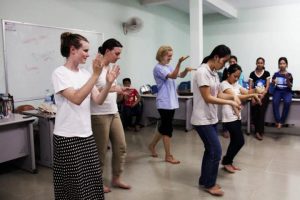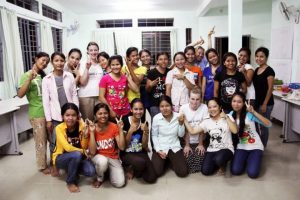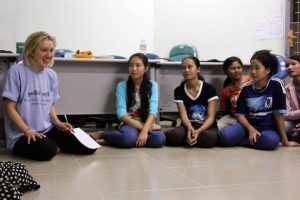In partnership with the PLF, a group of eight students from the Eugene Lang College at the New School in New York City spent five weeks conducting various innovative projects at PLF sponsored schools. Below is a write up from a female empowerment and leadership workshop held at the Bamboo Shoot Dorm in Siem Reap, carried out by Jordan Lapolla, Shelley Green and Fiona Mahurin.
As a major comp onent of our international civic engagement program, we have spent the past four weeks creating and implementing a series of workshops in the hopes of affirming a sense of self autonomy and leadership in the group of high school aged girls living at Bamboo Shoot City Dorm. We began this enterprise with an evening filled with ice-breakers, trust building games and general getting-to-know-you activities, aspiring to begin to create more intimate relationships with the girls in order to enable a more open and interactive connection throughout the entirety of our program at the dorm.
onent of our international civic engagement program, we have spent the past four weeks creating and implementing a series of workshops in the hopes of affirming a sense of self autonomy and leadership in the group of high school aged girls living at Bamboo Shoot City Dorm. We began this enterprise with an evening filled with ice-breakers, trust building games and general getting-to-know-you activities, aspiring to begin to create more intimate relationships with the girls in order to enable a more open and interactive connection throughout the entirety of our program at the dorm.
We arranged a wide variety of workshops including focuses on women’s health, domestic violence, Khmer women role models, art projects, self-identity activities, journaling and reflection, and compost building, oftentimes bringing in additional leaders to contribute local experience and knowledge into these  workshops.
workshops.
Knowledge sharing activities additionally helped us to build relationships and create a reciprocal environment where everyone was a teacher as well as a student. Intermixed were impromptu volleyball games, Khmer dancing lessons, and origami making – all of which maintained a fun working environment based primarily on building friendships. This component tremendously impacted subsequent meetings. As a result, we were able to bring silliness into serious conversations about difficult subjects, build trust while kicking with laughter on the floor, and humbly share and receive knowledge that removed us, the “teachers”, from our comfort zones.
To anyone moving forward with work at the Bamboo Shoot City Dorm, the importance of building relationships cannot be stressed enough. The conversations that we were able to have with the girls could not have worked had we not gotten to know them beforehand and established our presence there as a space in which they could ask questions or share thoughts openly.
In July, we arrived with many different possibilities for workshops and weren’t sure how to organize them. In our first meeting with the girls (and in the reflections that followed each week), we asked them to direct what the next several weeks would look like by prioritizing activities and workshops that interested them most. Each of the girls is incredibly smart, and with such busy schedules, we wanted to be sure that they were choosing which activities and information they wanted to focus on, so that their time in the evenings was not being wasted.
The positive respons e to this self-direction was immediately evident and valuable over the remaining weeks. Continued written reflection at the end of the day, helped us to improve our methods and cater to their needs and wants for later workshops.
e to this self-direction was immediately evident and valuable over the remaining weeks. Continued written reflection at the end of the day, helped us to improve our methods and cater to their needs and wants for later workshops.
It was important to receive feedback from the girls and keep flexible lesson plans during this time in order to maintain a self-directed working environment where their goals were consistently at the heart of our mission. We must also acknowledge our translator, Sophanit Prin, without whom, little of our work would have been possible. Having Sophanit, a Khmer woman with a background in working with girls, was crucial to our time at the dorm, and for her participation, we are each extremely grateful.
What has resulted from this past month of volunteerism was largely unintended, yet possibly more valuable than any goals we may have set ourselves. These consequences, quite often overlooked, are simple yet pertinent elements like an open space to think about and discuss subjects that may oftentimes be considered taboo, a reinforcement of the networks the girls have already formed with each other and a chance to form new relationships with strong and inspirational Khmer women, the creation of new experiences, the formation of ideas about future opportunities and ultimately, a bonding experience in a group that is willing to listen and understand.
by Jordan Lapolla, Shelley Green and Fiona Mahurin

Recent Comments